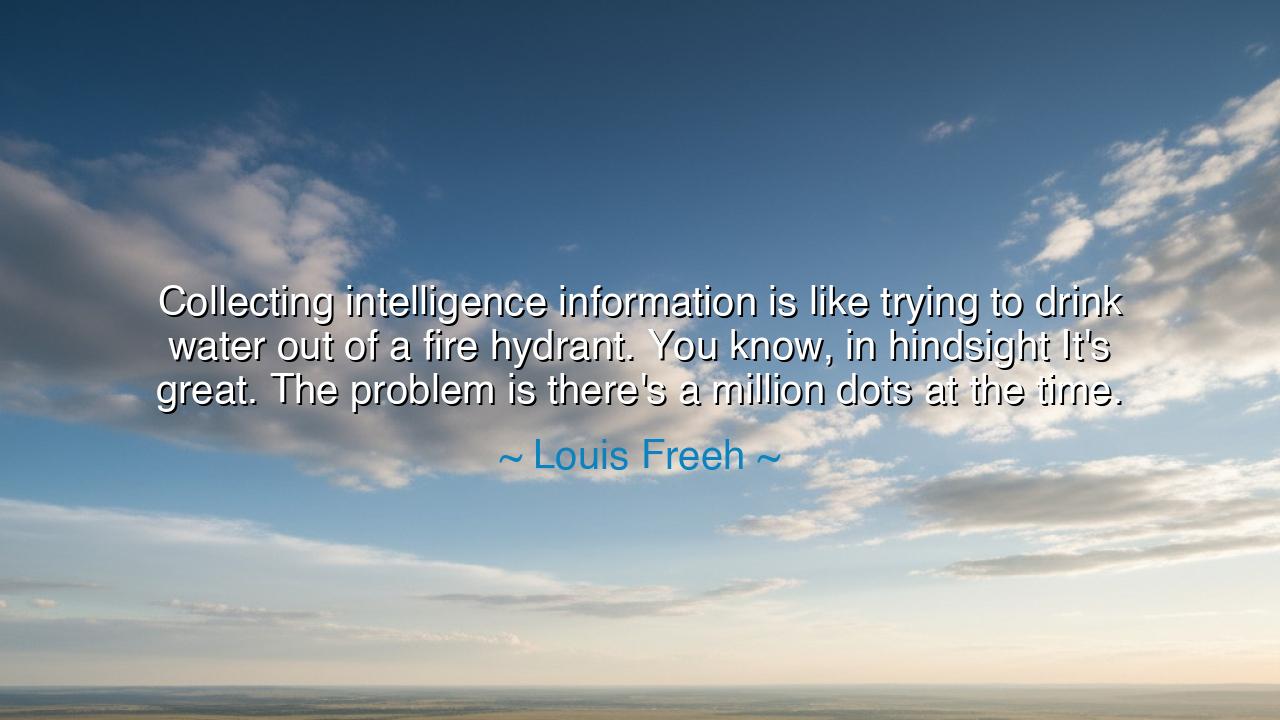
Collecting intelligence information is like trying to drink water
Collecting intelligence information is like trying to drink water out of a fire hydrant. You know, in hindsight It's great. The problem is there's a million dots at the time.






“Collecting intelligence information is like trying to drink water out of a fire hydrant. You know, in hindsight it’s great. The problem is there’s a million dots at the time.” – Louis Freeh
In these words, Louis Freeh, former Director of the Federal Bureau of Investigation, reveals the burden of perception that comes with guarding truth in a chaotic world. His image is vivid: a man kneeling before a roaring fire hydrant, overwhelmed not by thirst, but by the torrent of knowledge. To drink from such a stream is to be drowned by abundance; to gather intelligence is to face an ocean of signals, fragments, and whispers — a million dots whose meaning is clear only when the moment has passed. In this, Freeh speaks not only of espionage, but of the greater challenge that confronts every thinker, leader, and seeker of truth: the difficulty of seeing clearly amidst excess, of discerning order within the storm of information that floods the modern world.
The origin of this quote lies in Freeh’s reflections on the immense complexity of intelligence work, especially in the years surrounding the tragedies that scarred the late twentieth and early twenty-first centuries. He and his colleagues bore the weight of hindsight — the knowledge that connections, once invisible, now gleamed with tragic clarity. “The problem,” he said, “is that there’s a million dots at the time.” This is the essence of the human struggle with foresight: when we stand before the future, we see only fragments. The pattern of destiny reveals itself only after the fact. Thus, Freeh’s lament is not an excuse, but a recognition of truth — that the mind, no matter how disciplined, is finite, while the flow of information is infinite.
In ancient days, the philosophers spoke of this same dilemma under different names. Heraclitus declared that “no man ever steps in the same river twice,” for the waters are ever changing, and the man himself is changed. So too with intelligence — the river of information rushes endlessly, and the moment of perfect clarity is always just beyond reach. To “connect the dots,” as Freeh describes, is to battle the river itself, to extract wisdom from motion. It is a task that demands not only intellect but humility, for wisdom begins in recognizing the limits of human foresight.
Consider, as a living example, the story of Pearl Harbor. Before that fateful morning in December 1941, the United States possessed fragments of intelligence — intercepted codes, cryptic warnings, movements of fleets — yet no single piece revealed the coming storm. The dots were many, but the picture was incomplete. Only afterward, when fire and smoke filled the harbor, did the pattern emerge. Historians later asked, “Why did they not see?” But the truth is, as Freeh reminds us, the vision of hindsight is a false light — it illuminates the path already taken, never the road ahead.
And yet, Freeh’s words are not a resignation to fate, but a call to vigilance. For though it is impossible to see everything, it is possible to seek clarity within chaos. The wise learn not to drink the whole torrent, but to filter it — to discern the essential from the trivial, the signal from the noise. This is the art of intelligence, whether in the service of nations or in the quiet governance of one’s own life. To live wisely is to resist the temptation of overwhelm, to listen deeply, to look patiently, and to trust that meaning reveals itself not in haste, but in stillness.
In the realm of everyday existence, we too stand before our own fire hydrants — the endless flow of news, data, opinions, and emotions that flood our senses each day. We scroll, we consume, we drown. But as Freeh teaches, wisdom lies not in grasping everything, but in learning to pause, to breathe, and to let the true patterns emerge. For clarity is born not of more information, but of focused understanding. The one who trains his mind to see what matters will find truth where others find only noise.
So let this be the lesson passed down: you cannot drink from every stream, nor can you know every secret of the world. To seek wisdom is to accept that you will never see the full picture — only fragments, glimpses, threads of the tapestry. But with patience, humility, and discernment, you can connect the dots that matter. The fire hydrant may roar, the flood may rise, but the wise will not be swept away. They will draw from it a single drop of truth — and in that drop, they will find the essence of all that needs to be known.






AAdministratorAdministrator
Welcome, honored guests. Please leave a comment, we will respond soon